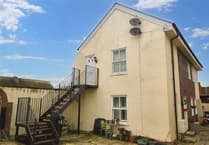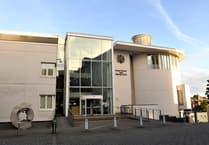THE newspaper that was to become the Mid-Devon Advertiser was born in Newton Abbot in 1863 – in an era of horses, carts and bicycles, and in the middle of the American Civil War. Queen Victoria was on the throne and Lord Palmerston was prime minister.
The Newton Weekly Journal was established by printer, painter and picture-frame maker James Welford – who was proprietor, editor, reporter, compositor, reader, foreman, pressman, clerk, canvasser, stationer and bad-debt collector, with the help of just one other – in offices at 10 Queen Street, a former grocery shop.
In 1870, the short-lived Newton Abbot Newspaper Co Ltd changed the paper's name to the East and South Devon Advertiser and it was sold in 1876 to Daniel Vile, later to become its editor.
The broadsheet then moved to premises next to the British School and changed offices yet again in 1879, to a house in Market Street.
At the time it was printed on one of the oldest presses in the west of England, an antiquated platen with a stone 'bed' worked by a weight and a lever.
In 1908, the company was sold to the Mid-Devon Newspaper Co, which would own it for the next 60 years and its title finally became the Mid-Devon Advertiser. AJ Coles (Devon dialect writer Jan Stewer) was its editor from 1909-13.
The Hearder family – publishers of the Newton News and Directory and Hearder's Almanac – began its connections with the business from 1920.
These ceased in 1969 when Beaverbrook Western took over the title, moving it to premises in Wharf Road. In 1976 it became part of West of England Newspapers Ltd, a subsidiary of Mirror Group Newspapers Ltd.
After that it was sold to a consortium of West Country businessmen until, in 1986, it came under the Devon and Cornwall Newspapers umbrella of Tindle Newspapers Ltd, an independent family-owned group with more than 70 titles.
The paper moved in 1990 to its present 450-year-old Grade Two listed premises, at the Old Manor House, Wolborough Street, Newton Abbot.
The medieval property – converted to accommodate newspaper offices – was built in 1534, five years before the dissolution of the monasteries.
Known then as The Great House, it was headquarters to the Abbots of Tor, who lived at Torre Abbey, Torquay, and was used mainly as a secular or civil court.
In the 19th century it housed a private school for a time and has since been a residence, the headquarters for a car dealer, architects' offices and the local Royal British Legion Club.
The building was bought in 1988 by Keith Stokes-Smith, who owns the title Lord of the Manor of Newton Abbot, and became the Advertiser's landlord.
A facsimile of the oldest available edition of the paper, July 17, 1869, was reproduced in 1990 to celebrate the move into premises which boasts Jacobean plasterwork, a brace of mediaeval fireplaces – and a ghost! The paper's editors since Mr Coles have been Arthur Pope (to 1951), Sam Street, John Kendall, Lance Samson (1973-1993) and Tony Stevens, who retired in August 1994.
He was succeeded by George Taylor, who was followed in an acting editorship capacity by Stephen Taylor. Ron White then became the paper's first editorial manager. He was followed by Keith Perry, and the present incumbent of that title is Ruth Davey.
The Mid-Devon Advertiser also has two sister papers serving the coastal resorts of Teignmouth and Dawlish.
Until 1982, they were covered by the Teignmouth and Dawlish Advertiser, but this was merged into the 100-year-old Teignmouth Post and Gazette and Dawlish Post on their acquisition from Farnham Castle Newspapers Ltd.
The Dawlish Post is a free distribution paper in the town itself, though the Teignmouth Post remains a paid-for weekly. All the titles underwent massive change in the early nineties when new technology was phased in, bringing the Mid-Devon Advertiser and its sisters into the computer age.
today, advertisements and news are produced on screen, as the newspapers prepare themselves for even greater success in the future.




